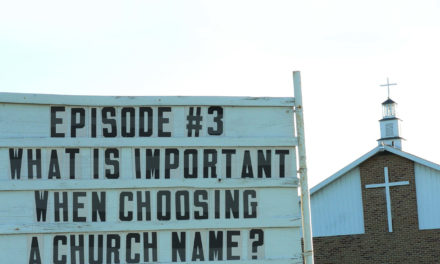Rick Egbert entered into vocational ministry in 2002 and served as a pastor at a local church for 15 years. He felt God’s call to transition his ministry into full-time therapeutic healing and has been privileged to see God’s life-changing transformation taking place in the lives of his clients. He received his Master’s degree in Mental Health Counseling from Trinity International University and is a professional counselor in Illinois. Rick enjoys working with individuals, couples, families, and those struggling with addictions. He has a special place in his heart for pastoral, adoptive, foster and blended families, as well as those raising children with special needs.
Danny: Welcome back everyone to 101 Questions Church Planters Ask. I’m your host, Danny Parmelee, and today we’re answering a listener submitted question “Should I just go ahead and get a therapist now?” I have zero context of the question, but it’s actually a really good one. And to help us answer that question, I’m super excited about our guest today, his name is Rick Egbert, and the reason that it is so awesome to have him on is not only his knowledge in this area, but Rick was a coach and mentor of mine when I was a church planter. And some of the advice and counsel that he gave me as a young church planter really completely changed some of the outcome stuff of what was going on at Epikos. So, I am — I tell him this all the time, he probably thinks I just say it to everybody, but I am super indebted, the church was super indebted to him pouring in and so, Rick, thank you so much for being with us here today.
Rick: Man, it’s my pleasure to be here, Danny. And man, you know I love pastors and I’m stoked to be here. I think that mental health is such a huge issue and I’m glad to be able to be here and help out.
Danny: Awesome. All right. A little background, because I think this is fascinating about you. I want to hear your three major job changes. So, in other words, going back to Discover into executive pastor of a megachurch and then now, into what you do now. And the reason why that’s so important is not just, you know, to brag about your amazing past, but to show why when you’re speaking to these issues that you have this ability to kind of understand what people are going through.
Rick: Yeah. So, briefly, I’m 114 years old. Right?
[LAUGHTER]
Danny: Exactly.
Rick: So, I had three very different careers. And so, I spent the first 21 years of my adulthood working in the corporate world. I was in IT and worked in many big companies, including Discover Card, was the last one. And then I — I came to faith late in life. I was 38 when I first came to faith. And within a few years I transitioned from the market place into full-time ministry and took a job at the chapel, which is in the northwest side of Chicago, a multi-site church, and worked in that capacity for 15 years. And during that time especially, you know, God put this call on my heart that — and I’ll talk a little bit more about this, we talked about some of the differences here, God placed on my heart that I — there were certain people that I just couldn’t help, as much as I wanted to. And so, God really focused my ministry. And on the third career, which is licensed counseling, therapeutic counseling. And so, I went through — it’s about a 10-year journey of managing that transition, and I’m now a licensed clinical professional counselor in the state of Illinois.
Danny: That is just great. And I do remember, we were still in a coaching relationship at the time, you said, “Hey, I think I’m going to change careers.” And I thought, you know, maybe you were drinking heavily, you’re the one that needed a therapist at that time. All right. So, let’s dive into the — a little bit — and part of this, you know, speaks directly to that question. I think of when like, a church planter moves to town, you know, they find a new primary care physician, but that doesn’t usually happen with counselors. Is there such a thing where you just go like, you don’t need one at the moment, but that it is wise to say, “All right. Well, this is my new setting, a new place, I’m just going to get one when I don’t need one.” So, I don’t know if you can speak to that a little bit.
Rick: Yeah. I think that there’s a lot of wisdom in doing that. And I think for a couple of different reasons. Right? The first is for personal reasons. Right? So, for yourself as a pastor, I mean, having been a pastor, I was not a lead pastor, I was an executive pastor, so that’s kind of second seat for most of that time. But I mean, let’s be honest, stress on pastors, it’s always been enormous. I don’t think it’s ever been as heavy as it is today. The expectations that people put on their pastors and that we as pastors put on ourselves, I think at times it can just be crushing. Right? And so, there’s a sense of, everywhere we go, we’re expected to be armed. Right? So, we got to be ready to give like, stellar catalytic leadership, unending compassion to whoever needs it. Right? Ready at a moment’s notice, any time of the day and night to go the hospital or be with whoever, listen to the person whose wife just said they’re going to leave them, be an inspiring teacher and preacher, be able to give spirit anointed prayer of any kind. Right? No matter what’s going on in our own lives. Words of encouragement. I mean, it’s just that it’s a staggering amount like, to be the CEO, the theologian, and, you know, it’s across the board. It’s just a staggering amount of expectations that we place on ourselves and that others place on us. So, I think for us, being able to manage some of those very stresses ourselves, I think it’s important. But there’s also, when you go in a new area, you’re absolutely going to have people in your congregation that are going to need help. So, I recommend to pastors to begin creating like, your resource referral list as soon as possible.
Danny: Yeah. That’s good.
Rick: And the best way to do that is to actually get on the phone and start talking to them. Right? Meet with them. Right? Most of them will be more than happy to take you out for a free lunch. Right? And we know, as pastors, we love our free lunch.
Danny: Yeah. Right? Of course.
Rick: So, yeah. I think there’s a lot of reason for people when they go to a new town for pastors to find somebody real quick.
Danny: That’s great. I love that. And like you said, it’s kind of a two-hit thing there, where you can even say, “Hey, I’m trying to build my referral list.” And there might be some people that you meet that, you know, that way you’re able to say, “Hey, yeah, I talked to this counsellor.” You know? “Give them a shot.” Or, “Here’s the three that I would at least start to recommend, as you have to kind of point other people in your congregation who need help with that. So, this is kind of a two-part question, besides just maybe, you know, doing a phonebook or an internet search and building that list. How do you find a good counsellor? Maybe what are some of the different, you know, questions that you might ask? And then the other thing is this. If you can speak to a little bit of the difference between, you know, life and certified Biblical counselling, spiritual direction. And I don’t even know what I would call you now like, are you a psychologist? Are you a therapist? Are you a counsellor? A doctor? I mean, I don’t know what —
Rick: I don’t know what I would call myself. Maybe a guru or a saint, or whatever. I don’t know. I’m being silly. Right? No. I’m a counsellor. I’m a therapist. So, the words — let’s go through that real quick. And we’ll kind of knock that in a quick order. So, therapist and clinician — so, therapist, counsellor, the states — licensing is handled by the states. So, those positions are now licensed in every state in the nation. Including Tennessee where you are, Illinois where I am, Wisconsin, you know? So, all the states. All the states, they all dictate that counselling is now something that must be done by a professional. They have to have a certain level of training, they have to pass certain board exams, and then they have to be licensed by the state.
Danny: Okay. And it might be a little bit different from state to state, but essentially, I can’t just go online and say, “You know what? I’m a pastor. I have some good advice. I want to be a counsellor.” So, I can’t use that term and set up my own practice.
Rick: Yeah. The one thing I would say is — one thing you didn’t list in your list was a life coach. So, here’s what I’m going to tell you about life coaches. They can be awesome and there’s no regulation, professional regulation of them whatsoever. So, I know people who literally have said, “Damn. I’m pretty wise. Let me go and take this eight-hour course and then build myself on Facebook as being a life coach.”
Danny: Trained. A trained life coach.
Rick: Trained. Certified. Right? So, all certified means is that somebody gave you a piece of paper to say that you’re certified. It means nothing. Right? And I’m not saying it means nothing, but it doesn’t give you the same kind of assurances as a professional license does.
Danny: Yeah. Okay. That’s good. And for some reason, I’m thinking of Tommy Boy right now. I believe there’s a line in there where he says, “You can certify a lump of crap.” Or something like that. So, certification doesn’t mean anything. So, licensed counsellor, that’s the thing.
Rick: Yeah. So, let’s talk briefly about it, and then I’m going to get to the criteria. Right? So, the term “biblical counselling” and I might step on some toes here. Right? So, biblical counselling is not what most people, most pastors think about when they think about biblical counselling. So, if I’m counselling somebody who is having some marital issues, okay, well, I go back to the Book of Genesis, right? And I talk about God’s design for marriage and I talk about husbands and wives in Ephesians 5 and I give all that stuff. Right? And I can work through a certain amount of stuff. That’s counselling using scripture. But there is a term that started like, back in the ‘60s that’s literally called Biblical Counselling with a capital B and a capital C, that means something very different. It is a whole school of thought that says that the kind of counselling that is both science and faith-based integrated together, that I do, is wrong. And so, there’s a whole, you know, school of that. And I respect those folks, I know we’re going to be in Heaven with them, but I think they’re wrong. Right? And so — yeah. So, in terms of — to answer the first question which is like, what do you look for? Right? How do you find people? So, two different things. One is, the pools that you fish in. So, the most effective pool to fish in is word of mouth. Right? So, you start, you know, put out on Facebook in an area like, “Hey, recommendations for a good Christian therapist?” Right? You want to stick with Christian therapists. However, there are Christian therapists and then there are therapists who are Christian. So, what I mean by that is that there are some people who, you would go to them in your practice and you would — they might be Christians, but you’d be hard-pressed to gather enough evidence in their actual work to say it influences the work that they do. Right? So, it’s a difference between them being a Christian counsellor. Right? So, word of mouth is the first pool to dig into. Whatever insurance pool you’re on, right, that you’re insurance covered, go under the providers. Most of them provide search, like, you can put in search arguments for “Christian”. Right? And just start going down those. Start looking at their web pages. Right? Do you see like, does it resonate with your heart? Start picking out some people. So, then when you meet with them and they’re willing to come like, “Hey. Can I buy you lunch?” Trust me when I’m saying, therapists are more than happy. Usually they have to be on the side knocking on your door. So, and in terms of, what are you looking for with them? So, you’re looking for faith, obviously. And faith that aligns with your faith. With your church’s doctrine. Right? And you can ask all those questions. A good Christian counsellor should be freaked out by that and they should be able to get you answers that defend where they’re at. Right? So, second is experience. Like, do you have experience, what experience — it isn’t like, are you experienced enough? But what areas do you have experience in? Because in my life, I have experience with working with pastors and with families that are adoptive families, foster families. So, I have — it’s mapped upon kind of where I’ve worked and where God’s led me, what paths he’s led me on. And then the final one is sin [00:12:38]. And this is just one like, you’re sitting with this person over lunch, right? And you’re like, “Hmm. Would I hand off somebody I care to this person? Would I let my wife — would I have my sister go to this person?” Right? You know? And if you have any catch in your spirit about that, it’s nay. You’re just like, “Hey. Thanks for lunch.” You know? And then you move on from there.
Danny: Right. That’s very good. Now, I know we could probably do a whole episode on “I don’t want to.” But I just wanted to kind of repeat back to you because I think you hit something important. So, the difference between Biblical Counselling and being a counsellor that is a Christian. Biblical Counselling, that capital B, capital C is a different process. It is not using the kind of therapy type thing. So, it is not saying “Well, I don’t do Biblical Counseling.” does not mean that you don’t believe in the Bible and that you’re not going to steer people in the biblical way. It just means that the capital B, capital C is “Here is kind of the way that’s done, all you –” I don’t want to minimize it by saying but, “Hey, your answers are going to be found right here. We don’t need to use any of the other healing principles over time.”
Rick: Yeah. It’s huge. And the basic principle is just everything that’s mentally health wrong with you, it comes directly from sin. And that any of the evidence-based scientific things that we’ve learned about brain science and all those kinds of things, none of that matters. So, yeah.
Danny: Right. So, that’s the nice thing about a podcast, we’re allowed to have opinions and stuff.
Rick: That’s right. And anyone who has questions about that can definitely email Danny Parmelee.
Danny: Yeah. Exactly. Okay. So, this is very good. We’ll go back to even that analogy of finding a doctor or a — yeah, when you find a doctor when you first move into town. Is there a type of thing where a pastor can just do a yearly check up or something like that? Like, “Yeah, I’m just going to put it on the calendar, there’s nothing wrong.” Or would a counsellor go, “What are you doing in my office? I have people that I need to see.” That would be like someone coming into the emergency room and saying, ”Hey, yeah, just check my pulse. Check my temperature. See if I’m doing okay.” Or are counsellors like, “No. That’s a really good thing. Just do a once-a-year check up and who knows, maybe some things will get discovered during that time and we schedule some more stuff.”
Rick: Yeah. It’s a great question. I’m liking it to, you know, you wouldn’t go to an emergency room for your annual check up. You would go to your doctor, your primary care physician. Right? And they’re not necessarily — they’re assessing your overall wellness. And so, there’s an element there of, you know, the same can be definitely true with a counsellor, of being able to go through it. Despite the fact that people think that counsellors want everybody to be crazy so that we always have clients. Right? We actually really care about people. And we’d much rather keep — just like doctors, we’d much rather keep people mentally healthy. Right? If I keep you — you know, if you’re my client, right, and I’m keeping you mentally healthy, you’re going to have far more — like, not only are you going to be healthier, you’re going to have far more referrals for me. You’re like, “Hey, the guy that helps me stay healthy is this guy over here. I think he can help you not only get healthy, but stay healthy.” So, it’s just overall. We want to raise the overall water level. So, preventative health is important for our body. It’s also important for our soul, our spirit, our mind.
Danny: Yeah. That’s great. I love, too, when pastors are able to even say that from the pulpit and to be able to even just throw in little things like, “Yeah, so, I was meeting with my counsellor. I do my check up.” Or just to mention those types of things to almost destigmatize, so to speak, this idea of going. All right. What are some of the signs — I know that pastors are very good at just kind of putting their head down and pushing forward and sometimes they’re not even aware, because they’re not taking time to even evaluate. But are there some things where maybe there are some signs like, “You know what? It’s time to be proactive. And this is more than just a check up. You need to kind of see someone.”
Rick: Yeah. I think that there are a lot of signs that we want to look at. I guess I would bucket them a little bit. You know, when you’re feeling overstressed, and that can be an easy place, right? But I’m not talking about overstressed once like, here we are, you know, right before the holidays, and there’s a sense of like, you know, okay, this is a crazy time to be a pastor. And there’s a pandemic. All those things. And so, of course there’s going to be some stress. But we’re talking about prolonged stress. Right? Where somebody’s experiencing significant signs of depression or anxiety. And we’ll talk very briefly about that. So, if you’re experiencing either a lot of sadness, kind of most days, right? Worry that’s hard to control. A big one is this thing called anhedonia, which is just another really fancy shmancy name which we counsellors have to have, it’s why we get a license, right? So we can have these fancy words. Anhedonia basically just means that we just kind of numb out, we lose interest in things we used to have an interest in and we don’t get pleasure out of things we used to get pleasure out of, which can start having signs of insomnia, difficulty concentrating, appetite change, you know, even thoughts of hurting yourselves. Right? There can be irritability that becomes really these types of things. All those signs of depression and anxiety. You can have a day or two like, we all have moments. Right? We all have days where we’re like, “Well, it’s a bad day. I feel like crap.” But it’s a different thing when that’s going on kind of week after week. Or one of the signs is when we find ourselves kind of in a compulsive and sinful behavior. Right? That we’re finding ourselves, you know, involved in porn, involved in other kind of, you know — I mean, pastors, we’re all human, too. Right? We can become addicted to prescription drugs just like anybody. Right? To porn, to any of the other number of things that, you know, people can become involved in. And so, those are all signs. The last one I’m going to mention is isolation. That’s a big thing for pastors, this sense of being isolated. Here they are, in a sea full of people. But they’re alone. Nobody has that perch that they do and all the expectations that come with it. So, those are all signs, I would say. If you’re experiencing those and it’s going on for more than just a few days at a time, you probably want to consider talking to somebody.
Danny: That’s great. Okay. Here’s kind of the final question. And you mentioned it a little bit already. But I’m wondering if you are seeing any just kind of patterns in pastoral kind of mental health, these things that maybe the rest of us are not seeing? And maybe there’s even a list in there like, “Man, I feel like the oddball here.” But just overall. Yes, pandemic stuff, but I mean, even before that type of thing you’re seeing.
Rick: Yeah. I think the biggest thing that I’m seeing is pastor burnout. I have a number of pastors as clients and I see a lot of burnout. So, you think a burnout manifests itself, I’ll go through this real quick, like it might manifest itself in four different ways. These might be other signs that are there. The first is alienation from our work-related activities. Right? And that might look like a ton of stress, a lot of frustration, cynicism. Right? When you stop — when you find yourself saying, instead of saying, “Oh, I got an appointment with Joe at four o’clock.” you find yourself saying, “Oh, yeah. I’ve got that four o’clock.” Right? It kind of dehumanizes it a little bit. Right? When we find outselves distancing ourselves and numbing out. All of that being alienation from kind of work-related activities. Second is when we have physical symptoms of burnout, like headaches and stomach problems, digestive issues. Seems like there’s so many pastors I know who have IBS, who have developed IBS. Right? It almost feels like a pandemic of itself, for pastors. Emotional exhaustion is a big sign of burnout. That’s the one we normally associate with burnout. We’re just drained all the time, we have an inability to cope with things, our resilience goes down. When we’re doing really well we can like, leap over a building in a single bound. Right? But when we’re burned out, it’s like, we trip over gravel. Right? It’s a really different thing. And extreme fatigue. And then the fourth thing that’s a sign of burnout is reduced performance. And so, we start to see in our job just like, things start to fall away, more and more things fall through the crack as we get cynical and burned out. And just to kind of round this out, there are a number of risk factors. I’m going to roll through these very, very quick like, that make somebody more susceptible to burnout. So, unreasonable time pressures. I know we don’t have any of these as pastors. Luckily enough. Right? A lack of communication and support from above. So, if you have a board or the denominational support isn’t — which of course, it’s not the case for your church planters, they have you, and I know you, and I’m teasing you. But I know you, I know that — but even with fellow workers or if there’s a board of elders or deacons, or whatever that stuff. Lack of role clarity. Little is as burnout producing as role ambiguity, if we are unclear about what our role is we feel really, really bad. Unmanageable workload. Again, as pastors, it seems like that’s the world we kind of live in. Relationships in our life that are below average or poor, marriage, kids, coworkers, etc. Poor spiritual well-being like, lack of well-being on the spiritual side. We can only give away what we have. If we’re dry and empty, we’re trying to give out of that. And finally, just the day to day tasks. When our day to day tasks don’t fit our calling or our gifting, it’s a huge risk for burnout. So, I hope that helps a bit.
Danny: Yeah. Perfect. No, that’s really great. And Rick, I just want to say thank you again, not just for being on the podcast, but honestly, for what you do. I know that you are just a huge resource to pastors and to lots of people that way. And I want to thank you, listeners, of course, for listening. And if you have any questions you can submit them at churchplantersask.com. And until next time, keep asking those questions.





